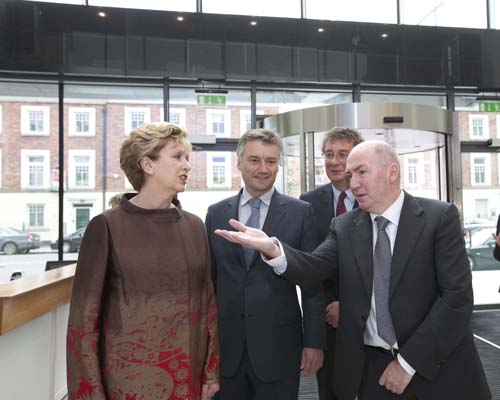World Experts in Cancer Discuss Advances in Cancer Care at Largest Conference of its Kind in Ireland
Posted on: 08 September 2011
World experts in the field of cancer have come together for a conference hosted by Trinity College Dublin to discuss advances in cancer care. The President of Ireland, Mary McAleese, opened the conference titled ‘State of the Art of Cancer Care’ (September 8th). Dr Susan O’Reilly, Director of the National Cancer Control Programme, also delivered a talk on the state of cancer care in Ireland at the opening of the conference. The conference is one of the main events of Trinity’s School of Medicine’s Tercentenary celebrations and takes place in the College’s newly opened Trinity Biomedical Sciences Institute.
Commenting on the theme of the conference, Chair of the Organising Committee, TCD Professor of Surgery John Reynolds, says: “The conference is focused on state of the art cancer care and how this is defined and delivered in 2011. Many international opinion leaders will join us for the meeting, and talks will highlight advances in cancer surgery, radiation therapy, chemotherapy and novel drug approaches, and how these are best delivered in the context of clinical trials and cancer research”.

President of Ireland, Mary McAleese, TCD Provost Dr Patrick Prendergast, Professor of Medicine and Vice-Provost of Medical Affairs at TCD Professor Dermot Kelleher, and TCD Professor of Surgery John Reynolds
“Cancer research today is enabled by major advances in the understanding of the human genome, allowing advances in understanding the impact of our innate genes on cancer risk, and how genes and proteins in cancer cells are altered. This has allowed us to hope that we are entering an era of personalised medicine based on an understanding of these changes in any individual with cancer, with numerous new targets for cancer therapy being uncovered, and many novel and promising drugs in use or in pre-clinical testing. Patients, the public, and indeed the medical profession need to appreciate the natural synergy of modern clinical cancer care with research and clinical trials.”
As part of the conference, a Public Symposium was held in association with the Irish Cancer Society on September 7th. The theme was ‘Fighting Cancer through Prevention, Early Diagnosis and Improving Treatments’ that featured talks by experts for the general public on cancer prevention, diet and lifestyle, cancer screening, as well as advances in treatment. In ‘A Questions and Answers’ session chaired by broadcaster, Aine Lawlor, four patients presented narratives of their own journey with cancer, and highlighted aspects of their experience and of living with cancer.
Over the course of the three day conference more than 20 international experts are speaking on cancer, including world-leaders in the area from the USA , Canada, UK, Germany, France, and the Netherlands. They are joined by leading experts in Ireland including TCD Professor of Clinical Oncology, Donal Hollywood and medical oncologist, Dr John Kennedy at St James’s Hospital among many others.
The TCD cancer conference in the tercentenary year of the Medical School also celebrates major contributions to the understanding of cancer, and its treatment, from its graduates and those who practiced in its teaching hospitals. There are many notable, perhaps the best known is Dennis Burkitt who described a particular cancer of lymph glands (Burkitt’s lymphoma) in the 1970s in children in East Africa, and a cure for this cancer. He also described the link between a low fibre diet and bowel cancer. Walter Stevenson, along with John Joly, in the early 20th Century used radium treatment for cancer by implanting small tubes containing radium directly into the tumour, this so-called Dublin method being the forerunner of techniques still in use. In the modern era cancer research is a major platform in TCD, with cancer drug discovery and biomolecular research being pursued in the new Trinity Biomedical Sciences Institute, and translational cancer research in the Institute of Molecular Medicine on the St. James’s Hospital site.
